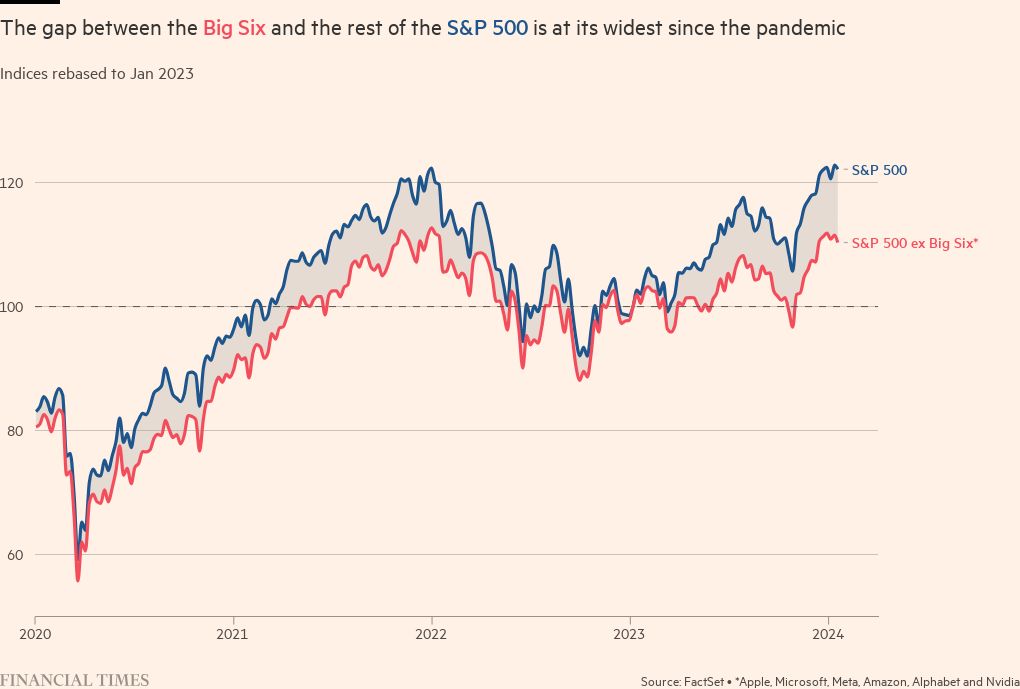Investors are eager to assess the financial outcomes of the significant investments made by major tech firms in advancing artificial intelligence, as the “Magnificent Seven” prepare to disclose their annual earnings in the upcoming days.
Apple, Microsoft, Meta, Amazon, Alphabet, Nvidia, and Tesla played a pivotal role in boosting the S&P index of leading US companies last year, contributing to 62% of its total 26% return in 2023. Notably, the S&P 500 achieved a record high at the end of the week following a remarkable surge in tech stocks.
Analysts at Bank of America anticipate that six out of the seven companies, excluding Tesla, which is projected to experience a decline in earnings, will steer the majority of profit growth within the S&P 500 during the announcement of their fourth-quarter results in the next fortnight. Without the contributions of these six companies, the year-on-year fourth-quarter earnings for the index would have shown a decrease.
The excitement surrounding Big Tech stocks has been amplified by the buzz surrounding generative AI, which has the capability to generate human-like text, images, and code rapidly. This cutting-edge technology is poised to deliver substantial productivity enhancements and disrupt entire sectors. The shares of these companies delivered an average increase of 105% over the past year.
Throughout the upcoming earnings season, investors will closely monitor the varying trajectories of these companies to discern which group is most effectively capitalizing on the AI surge.
According to Daniel Ives, a research analyst at Wedbush Securities, the upcoming Microsoft earnings report in the final week of January will be of particular interest as it will provide insights into the future landscape of software and chip sectors in the next 12 to 18 months. This period is deemed crucial in determining the frontrunners in the AI competition.
Microsoft and chip manufacturer Nvidia have been at the forefront of the AI revolution. Microsoft initiated a series of deals between tech giants and AI startups by announcing a $10 billion investment in OpenAI last year, solidifying its position as the primary supporter of ChatGPT, the creators of AI-powered chatbot ChatGPT.
The revenues generated from Microsoft’s subscription AI software, Copilot, and its cloud computing service Azure—both poised for growth through the integration of OpenAI technology—will be closely scrutinized as an early indicator of AI monetization in 2024.
Despite the recent upheaval at OpenAI, where Sam Altman was briefly ousted as CEO before being reinstated, investor interest in Microsoft remains unaffected. Microsoft has once again surpassed Apple as the world’s most valuable company by market capitalization. Additionally, Nvidia’s stock, known for producing leading AI chips, surged by 239% last year, nearing Amazon’s market cap of $1.6 trillion.
While Microsoft and Nvidia have demonstrated clear revenue growth from their AI offerings, analysts will be monitoring closely to see if other tech giants will update their financial projections this year as their AI investments start to yield results.
Competitors like Meta and Google, owned by Alphabet, have embarked on a spree of investments in AI startups and internal R&D efforts as they race to integrate AI into their product offerings. The performance of companies compelled to reinvest to seize larger AI opportunities, such as through increased spending on scarce high-end chips, will also be under scrutiny.
Google introduced its first standalone AI consumer product, the Bard chatbot, in May, followed by the Gemini model in December. However, critics have noted that the company, driven by its highly profitable search business, has been cautious in introducing generative AI products that could potentially disrupt its existing business model.
On the other hand, Apple and Amazon have been more deliberate in announcing substantial public investments in AI but are gearing up to unveil products to narrow the gap with industry leaders.
The fourth-quarter results will mark a year of resilience for Big Tech following the slowdown induced by the pandemic in 2022, which prompted companies to implement layoffs and cost-cutting measures at the start of last year.
Amazon Web Services, Microsoft, and Google have reaped the benefits of the global surge in enterprise spending on cloud services, while Meta and Google witnessed growth in advertising and consumer spending amid diminishing concerns of an economic downturn in late 2023.
Although there have been recent job cuts at firms like Google and Amazon to streamline costs and boost AI investments, the scale of these reductions pales in comparison to the extensive layoffs in January 2023, signaling a more optimistic beginning for the sector this year.
The anticipated earnings of Nvidia, Amazon, Meta, Google, Microsoft, and Apple are projected to decelerate to a year-on-year growth rate of 33% in the first quarter of this year, as per consensus analyst estimates. Tesla’s shares have dipped this year ahead of the fourth-quarter earnings release following downward revisions in profit forecasts.
The substantial investments in AI in 2023 are anticipated to be followed by the integration of this technology into a broader range of applications this year, potentially reshaping the landscape of successful AI products significantly.
Jefferies analysts foresee Amazon launching an aggressive initiative to catch up in AI this year, exemplified by the introduction of Amazon Q, an AI-powered assistant for cloud service users, in November.
Rumors suggest that Apple is intensifying its efforts in generative AI this year, including the development of an iPhone capable of running large language models despite memory constraints. In a discreet move, Apple unveiled an open-source AI model named “Ferret” with image understanding capabilities in October.
The robust cloud activity witnessed by Google and Amazon in the recent quarter, driven by the rapid adoption of AI across enterprises, is expected to lead to a surge in AI use cases and substantial monetization opportunities for these companies, according to Ives.






